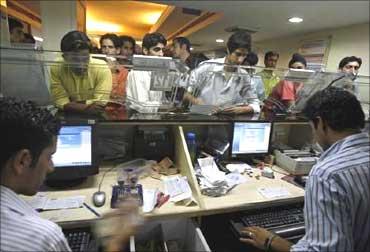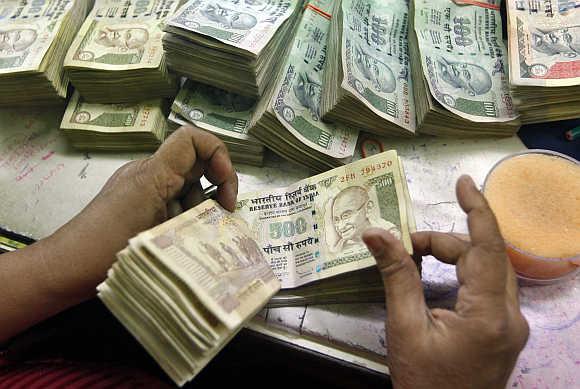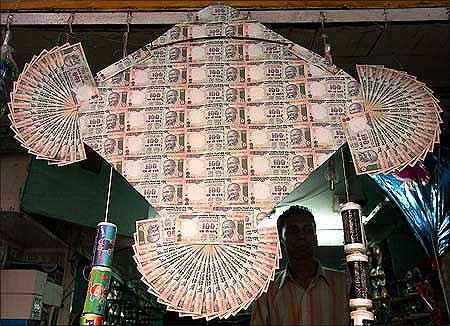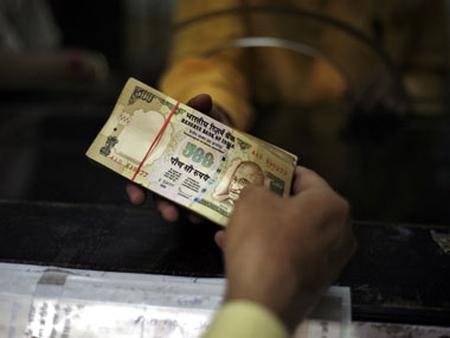 | « Back to article | Print this article |
Why India Inc should not own banks
The left-leaning Columbia University economics professor and Nobel laureate Joseph Stiglitz said in an interview that it would be 'very risky' to allow companies to own banks.
India has not issued a new bank licence since 2004.
There is a persuasive case to be made that India's banking sector needs to be more open; but aspects of the recent decision to award more licences are, none the less, disquieting.
Well-informed voices from across the spectrum of opinion have, in the past few days, been raised against the proposal to allow large business conglomerates to set up banks if they have a 'successful track record' -- judged, presumably, by the licensing authority -- and a minimum capital of Rs 500 crore (Rs 5 billion).
Click NEXT to read further. . .
Why India Inc should not own banks
The head of the Prime Minister's Economic Advisory Council, C Rangarajan, has urged the Reserve Bank of India to start by issuing licences to 'non-corporate businesses' first, and to look elsewhere only if there are no such qualified applicants.
The left-leaning Columbia University economics professor and Nobel laureate Joseph Stiglitz said in an interview that it would be 'very risky' to allow companies to own banks.
It was not allowed in the US, he added, and correctly so; the conflicts of interest that it would open up were 'sufficiently great' and regulators would 'not be able to circumscribe them easily -- or at all'.
Click NEXT to read further. . .
Why India Inc should not own banks
And the right-leaning economist Percy Mistry has also said allowing industrial houses to run banks would leave 'massive scope for malfeasance'.
Japan, he pointed out, is one country where banks and industries are enmeshed with each other, and it is still to emerge from a two-decade-old financial crisis.
Three voices as distinct from each other as these, and yet making the same point, should give the government pause in its relentless drive towards granting banking licences to industrialists.
Click NEXT to read further. . .
Why India Inc should not own banks
Ever since it was announced in the Budget by then finance minister Pranab Mukherjee in February 2010, the government has pushed hard for it, against an obviously unwilling RBI, the apex regulator for the sector, and in spite of prevailing expert opinion.
Banking is not like any other sector -- the conflicts of interest that can be set up in it have the potential to destabilise the entire economy and eventually cost taxpayers a fortune.
As it is, Indian taxpayers are bailing out, through state-owned banks, several companies that have benefited from a cosy relationship with bankers.
Click NEXT to read further. . .
Why India Inc should not own banks
It is not just possible but probable that banks owned by industrial groups with many and varying interests will use their depositors' money to keep their owners' concerns going long after other institutions would have thought it wise to withdraw.
Eventually such behaviour will destabilise the financial system, and the government will be forced to step in and write some cheques.
The truth is that India needs more world-sized and world-class banks, as the Narasimham Committee had argued.
Click NEXT to read further. . .
Why India Inc should not own banks
This will not be achieved by increasing the sector's complexity and instability, the end result of awarding bank licences to industrial houses.
Instead, the sector must be strengthened.
State-owned banks need to be gradually privatised -- whatever the horrified reactions in the Congress to reversing Indira Gandhi's decades-old mistake -- and foreign banks need to operate with fewer restrictions.
Disclosure: Kotak Mahindra and associates are significant shareholders in Business Standard Limited






